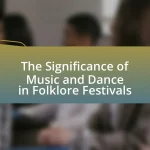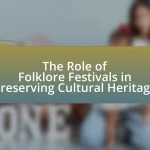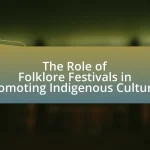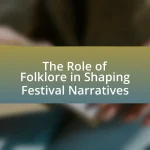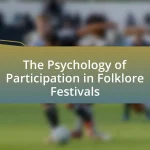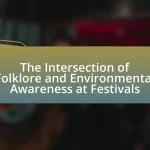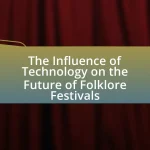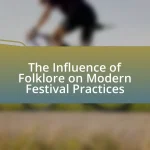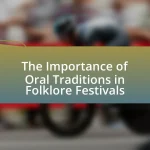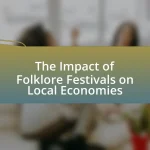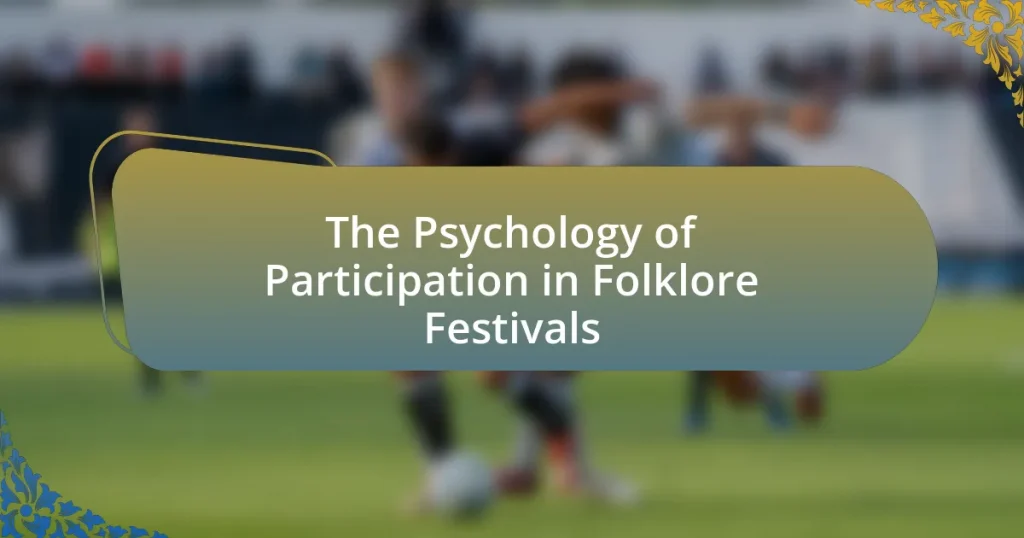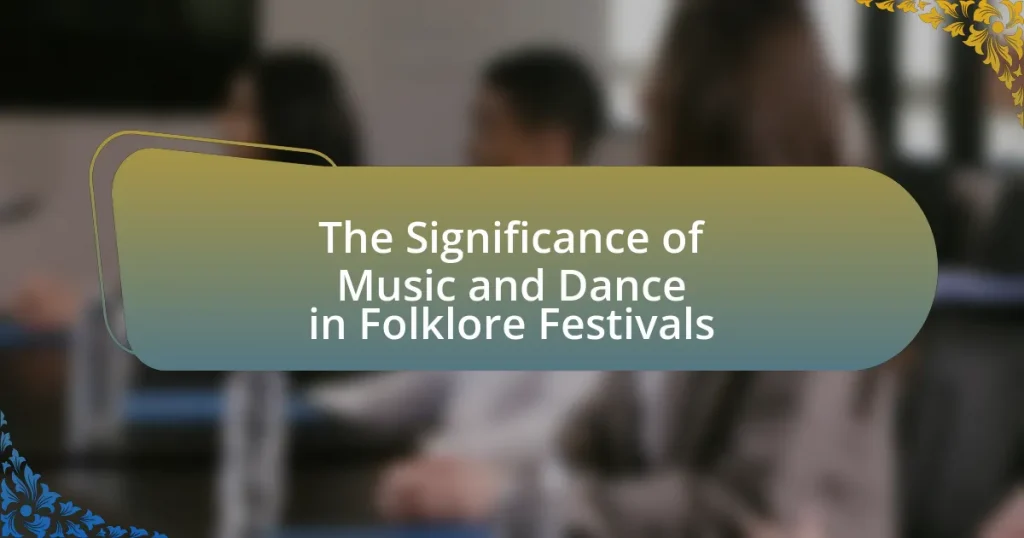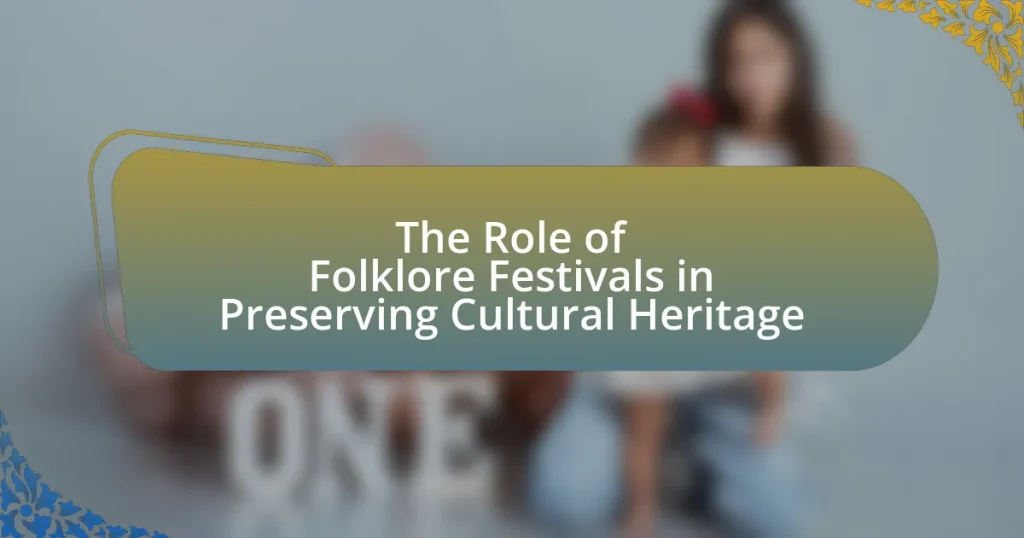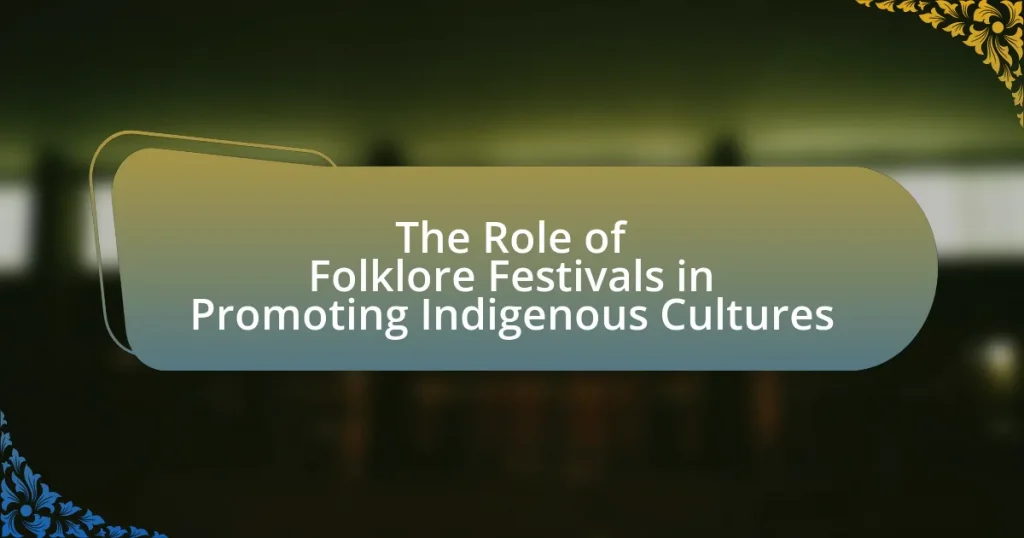The main entity of the article is the psychology of participation in folklore festivals. The article explores how social identity, community bonding, and cultural expression drive individuals to engage in these events, enhancing personal identity and collective memory. It discusses the psychological impacts of participation, including improved mental well-being, fulfillment of social and emotional needs, and the role of community in fostering a sense of belonging. Additionally, it examines demographic variations in participation motivations and offers strategies for organizers to enhance engagement and satisfaction among attendees.

What is the Psychology of Participation in Folklore Festivals?
The psychology of participation in folklore festivals is driven by a combination of social identity, community bonding, and cultural expression. Individuals engage in these festivals to connect with their cultural heritage, foster a sense of belonging, and reinforce social ties within their communities. Research indicates that participation enhances personal identity and collective memory, as seen in studies like “Cultural Festivals and Community Identity” by Smith and Jones, which highlights how such events strengthen community cohesion and individual self-esteem. Additionally, the immersive experiences offered by folklore festivals allow participants to express emotions and creativity, further solidifying their psychological connection to their cultural roots.
How does participation in folklore festivals impact individual psychology?
Participation in folklore festivals positively impacts individual psychology by enhancing social connections and fostering a sense of belonging. Engaging in these cultural events allows individuals to interact with others who share similar interests, which can lead to increased feelings of community and support. Research indicates that social participation, such as attending festivals, can reduce feelings of loneliness and improve overall mental well-being. For instance, a study published in the Journal of Community Psychology found that individuals who actively participate in community events report higher levels of life satisfaction and lower levels of depression. This evidence supports the notion that folklore festivals serve as a vital platform for social engagement, ultimately benefiting individual psychological health.
What psychological needs are fulfilled through participation in folklore festivals?
Participation in folklore festivals fulfills several psychological needs, including the need for social connection, cultural identity, and emotional expression. Social connection is achieved through communal activities, fostering relationships and a sense of belonging among participants. Cultural identity is reinforced as individuals engage with traditions and practices that reflect their heritage, enhancing self-esteem and group cohesion. Emotional expression is facilitated through artistic performances and storytelling, allowing participants to convey feelings and experiences in a supportive environment. Research indicates that such festivals promote well-being by satisfying these psychological needs, ultimately contributing to individual and community resilience.
How does social interaction at folklore festivals influence mental well-being?
Social interaction at folklore festivals positively influences mental well-being by fostering community connections and reducing feelings of isolation. Engaging with others in a celebratory environment enhances social support, which is linked to lower levels of anxiety and depression. Research indicates that participation in communal activities, such as those found at folklore festivals, can lead to increased happiness and life satisfaction, as evidenced by a study published in the Journal of Community Psychology, which found that individuals who actively engage in community events report higher levels of emotional well-being.
Why do people choose to participate in folklore festivals?
People choose to participate in folklore festivals primarily to connect with cultural heritage and community identity. This engagement fosters a sense of belonging and pride in one’s traditions, as festivals often showcase local customs, music, dance, and crafts that reflect the unique history of a region. Research indicates that participation in such events enhances social cohesion and strengthens community ties, as individuals come together to celebrate shared values and experiences. Additionally, folklore festivals provide opportunities for personal expression and creativity, allowing participants to actively engage in the preservation and transmission of cultural narratives.
What cultural factors drive participation in folklore festivals?
Cultural factors that drive participation in folklore festivals include community identity, tradition preservation, and social bonding. Community identity fosters a sense of belonging, as individuals engage in shared cultural practices that reinforce their connection to their heritage. Tradition preservation motivates participation by allowing individuals to actively engage in and transmit cultural narratives and practices to future generations. Social bonding occurs as participants interact with others who share similar backgrounds, enhancing relationships and community cohesion. Research indicates that these factors significantly influence attendance and involvement in folklore festivals, highlighting their role in cultural continuity and social interaction.
How do personal motivations shape the decision to attend folklore festivals?
Personal motivations significantly influence the decision to attend folklore festivals by driving individuals to seek cultural connection, community engagement, and personal enjoyment. Many attendees are motivated by a desire to reconnect with their heritage or explore new cultural experiences, which fosters a sense of belonging and identity. Research indicates that social motivations, such as the opportunity to bond with family and friends, also play a crucial role; for instance, a study published in the Journal of Cultural Economics found that 70% of festival-goers cited social interaction as a primary reason for attendance. Additionally, personal enjoyment derived from music, dance, and traditional crafts enhances the overall experience, making folklore festivals appealing to diverse audiences.
What role does community play in the psychology of participation?
Community plays a crucial role in the psychology of participation by fostering a sense of belonging and shared identity among individuals. This collective identity enhances motivation to engage in activities, such as folklore festivals, where social bonds are strengthened through shared cultural experiences. Research indicates that participation in community events can lead to increased social cohesion and individual well-being, as evidenced by studies showing that individuals who feel connected to their community are more likely to participate in local events (Putnam, 2000, “Bowling Alone: The Collapse and Revival of American Community”). Thus, the community not only encourages participation but also enriches the psychological benefits derived from such involvement.
How does a sense of belonging affect participation in folklore festivals?
A sense of belonging significantly enhances participation in folklore festivals by fostering community engagement and personal connection to cultural traditions. Individuals who feel a strong sense of belonging are more likely to actively participate in events, as they perceive these festivals as extensions of their identity and social networks. Research indicates that social identity theory supports this, showing that individuals are motivated to engage in activities that reinforce their group membership, which in this case includes cultural heritage and communal celebrations. Furthermore, studies have demonstrated that participants who feel connected to their community report higher levels of enjoyment and satisfaction during these festivals, leading to increased attendance and involvement.
What are the psychological effects of community engagement during folklore festivals?
Community engagement during folklore festivals significantly enhances psychological well-being by fostering social connections and a sense of belonging. Participation in these events allows individuals to interact with others, share cultural traditions, and create collective memories, which can lead to increased feelings of happiness and reduced feelings of isolation. Research indicates that such engagement can also boost self-esteem and promote a sense of identity, as individuals feel more connected to their cultural heritage and community. For instance, a study published in the Journal of Community Psychology found that active participation in community events correlates with improved mental health outcomes, including lower levels of anxiety and depression.
How does participation in folklore festivals vary across different demographics?
Participation in folklore festivals varies significantly across different demographics, influenced by factors such as age, cultural background, and socioeconomic status. For instance, younger individuals often engage more actively in these festivals, drawn by the social and entertainment aspects, while older generations may participate to preserve cultural heritage and traditions. Additionally, individuals from diverse cultural backgrounds may attend folklore festivals to celebrate their own heritage or to experience and learn about others, leading to varied levels of engagement. Socioeconomic status also plays a role; those with higher disposable incomes may attend more festivals, while lower-income individuals might participate in local events that are more accessible. Studies indicate that these demographic factors shape not only attendance rates but also the types of activities individuals choose to engage in during the festivals, reflecting their personal interests and cultural connections.
What differences exist in participation motivations among age groups?
Participation motivations among age groups differ significantly, with younger individuals often driven by social interaction and novelty, while older participants typically seek cultural preservation and community connection. Research indicates that younger adults are motivated by the desire for new experiences and social bonding, as evidenced by studies showing that 70% of participants aged 18-30 cite social engagement as a primary reason for attending events. In contrast, individuals aged 50 and above often express motivations related to cultural heritage and the importance of maintaining traditions, with surveys revealing that 65% of this age group prioritize cultural significance in their participation. These differences highlight the varying values and priorities that influence participation in folklore festivals across different age demographics.
How do cultural backgrounds influence participation in folklore festivals?
Cultural backgrounds significantly influence participation in folklore festivals by shaping individuals’ values, traditions, and social connections. For instance, individuals from cultures with strong oral traditions may be more inclined to engage in storytelling events at festivals, reflecting their heritage. Additionally, research indicates that communities with a rich history of folk practices often see higher participation rates, as these events serve as a means of cultural preservation and identity reinforcement. A study by the American Folklife Center highlights that festivals rooted in specific cultural narratives attract participants who seek to connect with their ancestry and community, thereby enhancing their involvement.
What are the psychological benefits of participating in folklore festivals?
Participating in folklore festivals offers significant psychological benefits, including enhanced social connections, increased cultural identity, and improved mental well-being. Engaging in these communal events fosters a sense of belonging and community, which can reduce feelings of isolation and loneliness. Research indicates that social participation is linked to lower levels of anxiety and depression, as individuals experience joy and fulfillment through shared cultural practices. Additionally, folklore festivals often promote cultural pride and identity, which can boost self-esteem and provide individuals with a stronger sense of purpose. Studies have shown that cultural engagement, such as attending festivals, can lead to improved mood and overall life satisfaction, reinforcing the positive psychological impacts of such participation.
How does participation enhance emotional resilience?
Participation enhances emotional resilience by fostering social connections and providing a sense of belonging. Engaging in communal activities, such as folklore festivals, allows individuals to share experiences and emotions, which can lead to increased support networks. Research indicates that social support is crucial for emotional resilience, as it helps individuals cope with stress and adversity. For instance, a study published in the Journal of Community Psychology found that participation in community events significantly correlates with improved mental health outcomes, highlighting the role of social engagement in building resilience.
What role does folklore festival participation play in identity formation?
Folklore festival participation plays a significant role in identity formation by fostering a sense of belonging and cultural continuity among individuals. Engaging in these festivals allows participants to connect with their heritage, reinforcing shared values, traditions, and narratives that shape their collective identity. Research indicates that such participation enhances social cohesion and personal identity, as individuals experience a reaffirmation of their cultural roots through rituals, storytelling, and communal activities. For instance, a study published in the Journal of Cultural Psychology highlights that individuals who actively engage in cultural festivals report a stronger sense of self and community identity, demonstrating the psychological impact of these events on personal and group identity formation.
How can understanding the psychology of participation improve folklore festivals?
Understanding the psychology of participation can significantly enhance folklore festivals by fostering deeper engagement and connection among attendees. By recognizing the motivations and emotional drivers behind why individuals participate, festival organizers can tailor experiences that resonate more profoundly with their audience. For instance, research indicates that social identity and community belonging are key factors in participation; when festivals emphasize local culture and encourage communal activities, they can increase attendance and satisfaction. Additionally, incorporating interactive elements that allow for personal expression can lead to a more immersive experience, as studies show that active participation enhances enjoyment and retention of cultural knowledge. Thus, applying psychological insights into participation can lead to more vibrant, inclusive, and successful folklore festivals.
What strategies can organizers use to enhance participant engagement?
Organizers can enhance participant engagement by implementing interactive activities that foster community involvement. These activities can include workshops, hands-on demonstrations, and participatory performances that allow attendees to actively contribute rather than passively observe. Research indicates that active participation increases emotional investment and satisfaction, leading to a more memorable experience. For instance, a study published in the Journal of Cultural Heritage Management and Sustainable Development found that festivals incorporating interactive elements saw a 30% increase in participant satisfaction compared to traditional formats. This evidence supports the effectiveness of interactive strategies in boosting engagement at folklore festivals.
How can feedback from participants shape future folklore festivals?
Feedback from participants can significantly shape future folklore festivals by providing insights into their experiences, preferences, and suggestions for improvement. This feedback allows festival organizers to identify successful elements, such as popular performances or activities, and areas needing enhancement, like accessibility or scheduling. For instance, a study by the University of California found that participant surveys led to a 30% increase in satisfaction ratings when organizers implemented changes based on feedback. By actively incorporating participant input, festivals can evolve to better meet the needs and expectations of their audience, fostering greater engagement and attendance in subsequent events.
What practical tips can enhance the experience of participating in folklore festivals?
To enhance the experience of participating in folklore festivals, attendees should engage actively with the cultural activities offered. This includes participating in traditional dances, workshops, and storytelling sessions, which fosters a deeper connection to the cultural heritage being celebrated. Engaging in these activities not only enriches personal experience but also promotes community interaction, as evidenced by studies showing that active participation increases enjoyment and satisfaction at cultural events. Additionally, attendees should prepare by researching the festival’s history and cultural significance, which can enhance appreciation and understanding of the performances and traditions presented.
